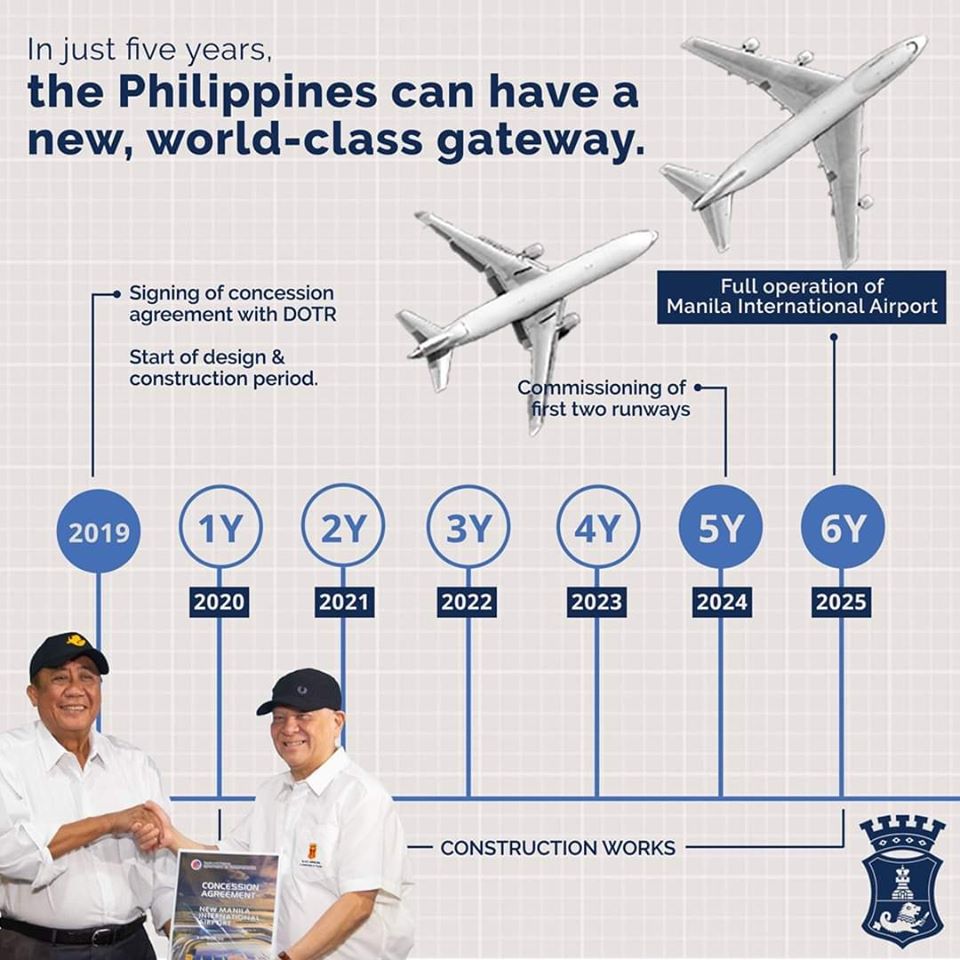Last Updated on February 23, 2021 by OJ Maño
San Miguel Corporation (SMC) started training Bulacan residents as part of its job creation program for the soon-to-be-built Manila International Airport. The airport is expected to create jobs for Bulacan residents and residents of neighboring provinces during its construction and operational phases in the coming years.
READ Better jobs, better lives SMC starts extensive skills training for Bulacan residents article.
Bulacan Airport to Create Jobs for Bulacan Residents and Returning OFWs.
SMC president and chief operating officer Ramon S. Ang said that being prioritized for initial hiring are local residents of Bulacan, in particular, relocatees from Bgy. Taliptip, where the airport is to be built. They will have jobs for Bulacan residents that had been relocated to give way to the airport. The former residents, 60 in all, are set to start their training under the Technical Education Skills Development Authority (TESDA), which designed courses on skills specific to the needs of the airport’s construction.

“We designed these skills training program with TESDA specifically to equip Bulakenos with the necessary skills needed to either work at the airport project, put up small businesses to support airport workers, or even start on their own elsewhere if they choose to do so,” said Ang.
“Over the next couple of years, construction of this massive airport will generate hundreds of thousands of direct and indirect jobs. We will prioritize local residents, but there will be so many jobs and livelihood opportunities that ultimately, workers will come from all over Bulacan, Central Luzon, even Metro Manila, and southern Luzon,” said Ang.
With the COVID-19 pandemic resulting in an economic downturn, Ang said that the company is now even more determined to push through with large-scale infrastructure projects, such as the airport, to boost the economy and provide employment to many Filipinos who have been rendered jobless.
“Construction activities will have an immediate economic impact on so many sectors. These create much-needed jobs that put money in people’s hands and allow them and their families to spend on their needs. This spending benefits many small and medium businesses, local eateries, sari-sari stores, groceries, and service establishments,” Ang explained.
“Apart from direct jobs, the company also has to pay for suppliers of materials, equipment, or services, which then generates even more jobs and benefits more people. Short to medium-term, we can help so many Filipinos with jobs and help kickstart our economic recovery. Long-term, this airport will help create even more growth opportunities for our country,” he added.
Besides residents, Ang said SMC would also open employment opportunities to Overseas Filipino Workers (OFWs) who have been returning in droves to the country recently due to the uncertain global economic conditions.
“A lot of Overseas Filipino Workers (OFWs) had to return to the country in recent months after they lost their jobs. Many are not sure if they will be getting new contracts from their foreign employers given the difficult economic conditions. With this world-class airport project, those who will opt to stay home will no longer be separated from families and will have a viable option,” Ang said.
“We have so many talented and experienced Filipino skilled workers and engineers and they can really be an asset to this project. It’s a project they can be proud of, and tell their grandchildren about,” Ang added.
The first batch of 60 residents is set to receive training in courses such as shielded metal arc welding, electrical installation and maintenance, and heavy equipment operations. Meanwhile, courses such as dressmaking and cookery are also on offer for residents that want to be self-employed. All trainees for this initial batch will be given toolkits or tools for their chosen trade.
The courses take anywhere from 10 to 20 days to complete and are paid for by SMC. Once they complete the training programs, students will undergo the TESDA skills assessment test before National Certificates or NCII are given to them. As part of SMC’s assistance package to relocating Taliptip residents, all trainees will also undergo entrepreneurship training for three days, especially if they plan to put up small businesses.
Meanwhile, Ang said that graduates of heavy equipment Operators, electrical installation and maintenance, and shielded metal arc welding courses will be referred to SMC Aerocity, SMC’s company under SMC Infrastructure that handles the airport development.
Ang clarified that the training will not be limited to Taliptip residents. Rather, it will be a continuing program with TESDA to provide opportunities, especially for Bulakenyos, to learn alternative skills and respond to the job requirements at the airport.
The P734-billion airport project, to be built at no cost to the government, is seen to solve the perennial congestion problems at the country’s primary gateway. This airport will initially feature four parallel runways with a provision for two more; a world-class terminal, and an infrastructure network that will include a mass rail system to ensure easy connectivity.
READ: Soon to Rise: A World-Class Bulacan Airport Worth $15B
The airport will be capable of handling up to 100 million passengers per year, seen to create about 30 million tourism-related jobs, and generate more than a million direct jobs for the host province Bulacan and nearby provinces.
Aside from direct employment, SMC said the airport project will also give rise to new local industries and boost existing ones, as construction, as well as operation, will require suppliers, maintenance contractors, food providers, accommodations, and the like.
San Miguel Aerocity Inc. is expected to build a world-class airport that will:
- Generate 400k jobs during construction
- Generate 1 million jobs once fully operational
- Accommodate 100 million passengers annually once fully operational
- Host 60 aircraft movements per hour per runway
- Fuel trillions of pesos in economic activity
- Bring in 35 million tourists annually